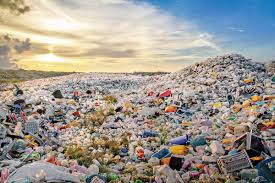Backed by some environment groups, this coalition has called for common, legally binding provisions to “restrain and reduce the production and consumption of primary plastic polymers to sustainable levels.” They also are proposing measures such as phasing out “problematic” single-use plastics and banning certain chemical additives that could carry health risks.
More than 200 consumer-facing companies including Unilever, PepsiCo and Walmart have joined the so-called Business Coalition for a Plastics Treaty
Plastic production is on track to triple by 2060 – unless the treaty sets production limits, as some have proposed. Most virgin plastic is derived from petroleum.
WHAT IS THE CHALLENGE IN OTTAWA?
This week’s talks are set to be the biggest yet, with some 3,500 people registered to attend including lobbyists, scientists and environmental non-profits.
But countries have become divided on the issues during three previous rounds of talks – held in Punta del Este, Uruguay, Paris and most recently in Nairobi.
At the Nairobi talks in November, the draft treaty under review ballooned from 30 pages to 70 as some countries insisted on including their objections to more ambitious measures like production limits and phase-outs.
Countries are now under pressure to find common ground before the final negotiations are held in December in Busan, South Korea.
WHAT DO COUNTRIES WANT IN THE TREATY?
Many plastic and petrochemical-producing countries including Saudi Arabia, Iran and China – known collectively as the group of Like-Minded Countries – have opposed mentioning production limits.
They blocked other countries from formally working on proposed treaty language calling for production caps, chemical disclosures or reduction schedules after last year’s Nairobi session.
Meanwhile, the 60-nation “High-Ambition Coalition,” which includes EU countries, island nations, Japan and the UAE, wants to end plastic pollution by 2040.
Backed by some environment groups, this coalition has called for common, legally binding provisions to “restrain and reduce the production and consumption of primary plastic polymers to sustainable levels.” They also are proposing measures such as phasing out “problematic” single-use plastics and banning certain chemical additives that could carry health risks.
The U.S. says it also wants to end plastic pollution by 2040. But unlike the High-Ambition Coalition, it wants countries to set their own plans for doing so, and to detail those plans in pledges sent regularly to the United Nations.
WHAT DOES THE PETROCHEMICAL INDUSTRY WANT?
The trade group Global Partners for Plastics Circularity represents major petrochemical producers including members of the American Chemical Council and Plastics Europe.
The group argues that production caps would lead to higher prices for consumers, and that the treaty should address plastics only after they are made.
These companies want to focus on encouraging the reuse or recycling of plastics, and on developing the market for burning plastics as fuel, though a previous Reuters investigation found enormous obstacles in this method. In terms of transparency about chemicals used in production, the group says companies should be allowed to disclose those chemicals voluntarily.
WHAT DO CORPORATE BRANDS WANT?
More than 200 consumer-facing companies including Unilever, PepsiCo and Walmart have joined the so-called Business Coalition for a Plastics Treaty.
Like the petrochemical industry, these companies that rely on plastic packaging for their products have been a major presence in the plastics negotiations.
But they support a treaty that includes production caps, use “restrictions and phase-outs, reuse policies, product design requirements, extended producer responsibility, and waste management,” according to a statement ahead of the Ottawa talks.
Reuters

